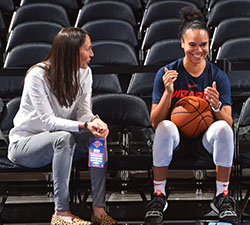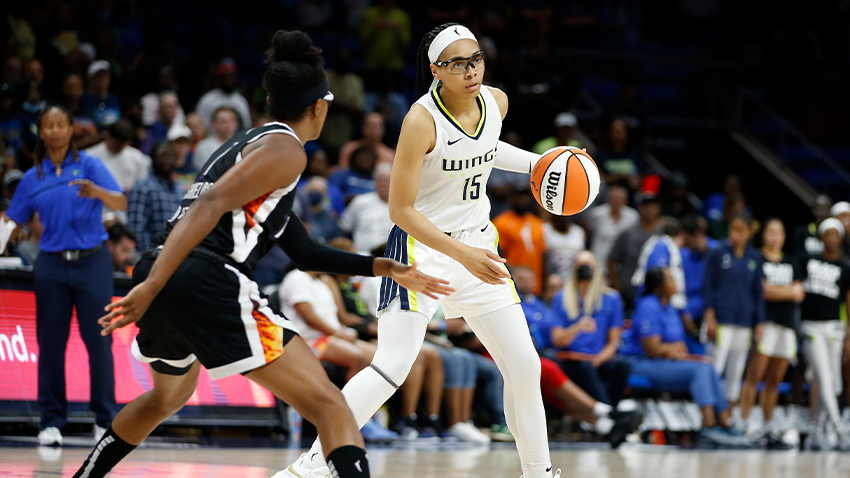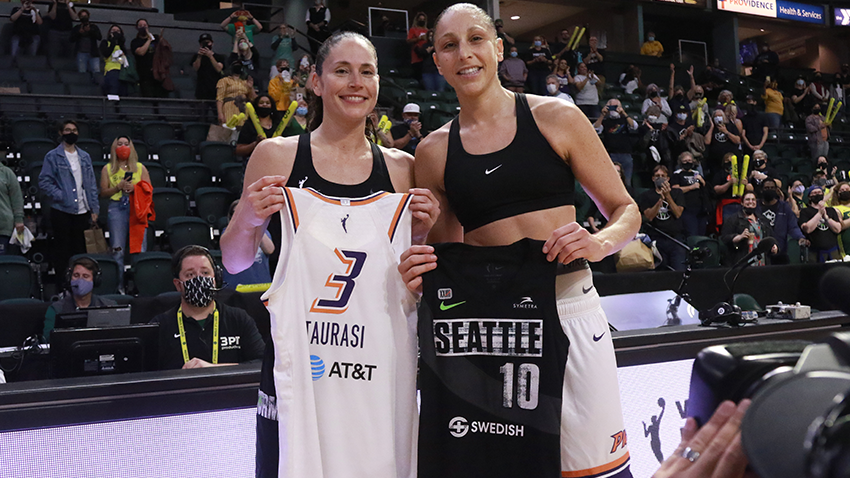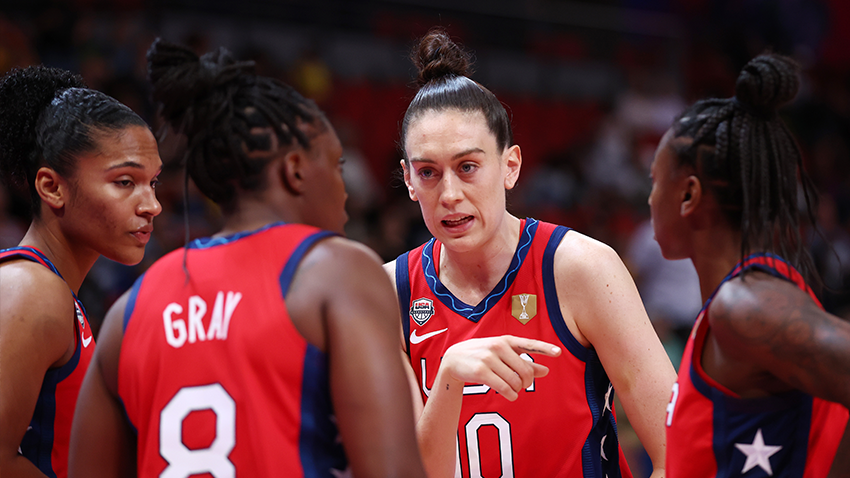The Timelessness of Sue Bird

The 2022 season is reaching its most heated stage as the playoffs round out, with the final four teams dueling out for a shot at the WNBA Finals. There’s a bittersweetness in knowing the summer of competition is coming to a close, but this year has thrown in an extra dash of the bitter.
Three greats in the history of the W are walking away after the season.
Sylvia Fowles, one of the greatest to set foot on the hardwood, has already played her final game. We may never see a player quite like the 2017 MVP and four-time Defensive Player of the Year again.
Briann January was a stalwart perimeter defender and a key cog in numerous deep playoff teams, though she still is in the thick of the postseason with Seattle.
To call Sue Bird an icon and legend in sports somehow doesn’t fully capture the spirit of what she’s brought to the WNBA and women’s basketball.
I was in preschool the last time Bird wasn’t in the league. Star Wars Episode II: Attack of the Clones and the original Sam Raimi Spider-Man were in theaters. The Grizzlies were rounding out their first season after relocating to Memphis. Alicia Keys took home five awards at The Grammys (RIGHTFULLY), including Best New Artist.
Four WNBA titles, Five Olympic Gold Medals, Five Euroleague titles, Eight All-WNBA Team selections, and many other awards highlight Bird’s on-court success and contributions.
Bird’s career has spanned nearly a quarter-century in the W, a remarkable feat of longevity and endurance. It isn’t easy to picture basketball without her.
Even before my own association with the league, Bird has been a staple in the backdrop of my life. I’ve known who she is since I could first really grasp sports as a child. Waking up and watching Sportscenter every morning, reading the daily headlines, and keeping myself fully invested in sports rarely did a week pass without reinforcing who Sue Bird is and her greatness on the court.
The way Bird plays the game is so fascinating; she’s adapted her game over the years as her physical abilities have changed, but she’s primarily embodied the same principles within her archetype as a player. Modern and innovative basketball has coursed through her veins since her time at UCONN.
While the W has long been ruled by posts and interior play, she etched her name in stone through her court vision, playmaking feel, and shot-making. Every aspect of her game intertwines as one of the premier pick and roll operators the sport has seen.
Bird is often remembered for her playmaking, and rightfully as we’ll get into, but I’m not sure quite enough is made of just how incredible of a shooter she is. The second leading Player in W history in both three-point attempts and makes, Bird has launched nearly six threes per 40 minutes throughout her career at a 39.2% clip, according to Her Hoop Stats. Her efficacy and volume have only risen as the years have passed.

Her shot is compact, fluid, and swift. Her footwork and angling, taking immaculate paths to her spot, has made her a deadly threat moving without the ball in her hands throughout her career. Sue Bird running off screens from any which way in a myriad of sets has been a foundational piece of Seattle’s offense regardless of who the coach has been.
Her quick relocation and pinpoint movements to garner more open looks are pivotal to overwhelming shooting gravity. So many of her shots have this boomerang nature; she rarely stops and holds the ball. Even though she doesn’t penetrate the paint and generate interior touches as she did in her prime, her ability to bend the margins with quick defense processing stands out even more now.

Notice how Napheesa Collier sinks down to help on Breanna Stewart in the post after initially thwarting the Stewart/Bird pick and roll, denying a pull-up three or pass to the roller. Bird flips the ball as soon as the action dies and then drifts to the left to force a longer and more awkward closeout, taking advantage of Stewart’s gravity to boost her own.
It seems minute, but that routine shifting and movement away from the play is a significant part of what makes Bird such a high-level offensive player. Her fit has been seamless with numerous quality post players because of her ability to blend her game and play off of them.
Clutch shots are in her DNA, a definite factor in Seattle’s longtime success in the regular and postseason.

She always feels on balance even when it doesn’t seem possible to be so.
In my eyes, her pull-up shooting is what bends the game in her favor and most unlocks and amplifies her playmaking.

She’s not quite the same threat pulling from behind screens as she once was, as the threat of her knifing into the paint isn’t the same. Yet, going underneath a screen for Bird still feels like a catastrophic gamble in 2022.
Quick-hitter pitch plays, immediate screens as far out to 30 feet, and calling in her own number in transition have been vital parts of her offense in the last half-decade of Storm basketball and pillars of the Bird/Stewart era. While they’ve typically been a team that plays at an average pace of play or slightly lower in that time frame, their ability to rip, run, and go off-kilter keeps defenses honest and guessing.
Extending the defense as far out as possible is what opens up the angles and lanes for one of the greatest playmakers in basketball history.
You’ve probably seen this one, but I’d be remiss not to show it again, because, come on.

She has an innate sense of where everyone, her own teammates and defenders, are on the court at all times. That court-mapping and awareness open the door for the audacity in her game as a passer. I can count on both hands the number of players who so effortlessly hit no looks, real no looks that actually manipulate the defense, so routinely.
Kickaheads in transition are her wheelhouse. Catching defenders with an up-fake or hesitation and then diming up a cutting teammate to the basket; is also her bread and butter.

Her ability to hit every pick and roll pass afforded by the defense, cycle through reads in but a moment, and craft the best looks possible never ceases to amaze.

It’s incredibly odd to think that I won’t see a Sue Bird pass I haven’t seen before by late September. There’s an uncomfortable feeling of each assist, each basket, each moment where you count it down “well, how many more of those are left?”
I don’t mean that in a somber or depressing sense, but it’s in the same vein of what it felt like watching Sylvia Fowles’ final game, “That’s probably the last time I’ll see her make an awesome help-side contest at the rim. Is there another opportunity for her to expertly blow up a pick and roll despite playing one on two?”
Witnessing the dwindling moments of a career you could never quite picture ending is odd. In some ways, it’s special because it makes us rewind and remember. It makes us appreciate the small things more in the moment. A Sue Bird behind the back means more to me the next week and change than it has in the past few years of my enjoying the game.
At least for me, watching greatness is something I have to remind myself of. I have to bring myself back into reality and go, “hey, this stuff isn’t normal!” as I watch the greatest players put forth incredible feats with a regularity that shouldn’t exist, but that’s what makes them great.
It’s easy to take for granted the routine, so I find it imperative to remember that the routine is only such at the highest level because of that same greatness. I find myself so rooted in Candace Parker’s otherworldly postseason play, even more so than I would’ve been a few years ago. I would’ve been able to notice in the moment what she was doing was incredible regardless of age. Still, each mention of her being 36 and the ambiguity of her future in the league keeps me focused on the present.
I don’t know how many more assists, triples, or iconic moments Bird has left in the W. I don’t know if she’ll make one last Finals as the Storm seek to return for the third time in five seasons. I do know that I’ll be glued to my television, soaking in every minute Bird sees the court in her final postseason run.
Her place in history is forever cemented as one of the all-time greats in basketball, a pioneer who helped pave the way for the league’s growth, and an icon of individual and team success.
WNBA reporter Mark Schindler writes a column on WNBA.com throughout the season and can be reached on Twitter at @MG_Schindler. The views on this page do not necessarily reflect the views of the WNBA or its clubs.




,xPosition=.5,yPosition=.5)
,xPosition=.5,yPosition=.5)
,xPosition=.5,yPosition=.5)
,xPosition=.5,yPosition=.5)